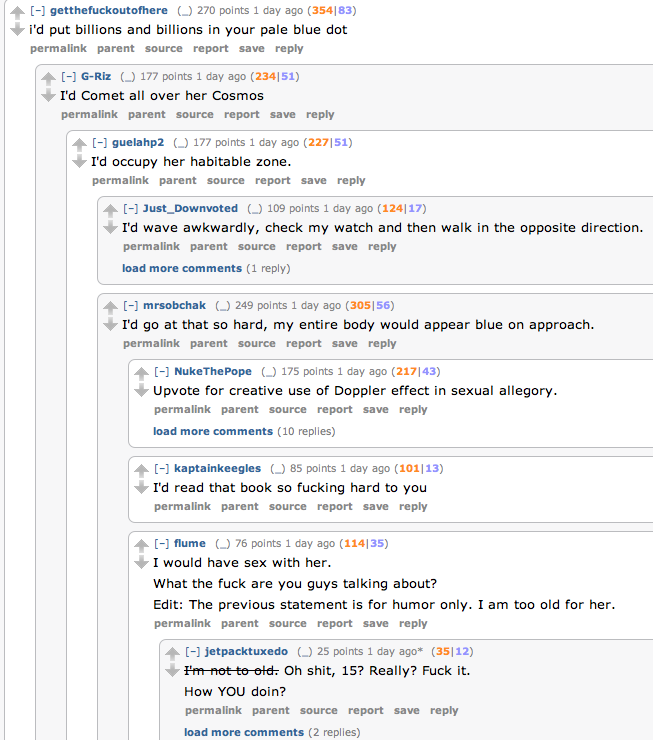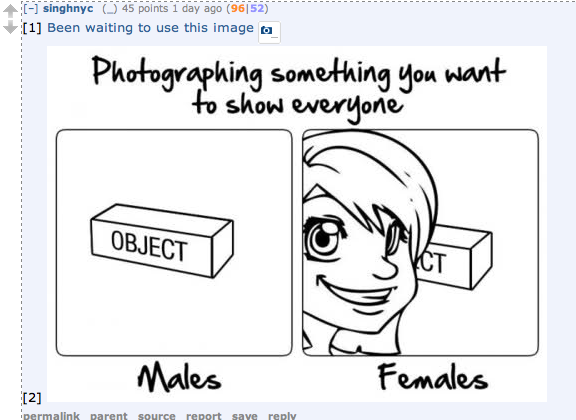



In 2012, studies led by Philippe Bernard proved that men and women objectify sexualized women.
The hypothesis tested was simple: we recognize objects easily when they appear upside down, but not people.
Scientists showed both men and women images of themselves in sexually suggestive poses, both men and women more readily recognized women over men when they were shown upside down.
Back in 2009, Susan Fiske discovered that women wearing bikinis were less likely to be viewed as human, but as objects of action. This effect however didn’t occur around women they knew intimately, such as mothers or girlfriends. Fiske warned that women ought to be aware of how they dress in the workplace as men were “hardwired” to objectify strangers.
In other words, only women could look “slutty”; men wouldn’t. And people could use biological determinism to justify the way everyone objectifies everyone.
So there was finally empirical truth to sexual objectification-it didn’t just condense from the feminist hivemind-but I wondered if decades of increasingly raunchy porn and lifestyle advertising had a latent role in reinforcing these perceptions.


Think of sex-divided washrooms and fashion stores. Public spaces are gendered spaces; the web is gendered space. Once you reveal yourself to be a female-identified user, people treat you like one. On the internet I cannot escape who I really am, I can only abandon my body.
 Hey girl, I bet he’s playing a female wizard
Hey girl, I bet he’s playing a female wizard
because only 2% of women play games!
The internet has allowed women and gender-queer people to reinvent and explore sexual identities by sharing self-imagery that radically differ from the limited versions of femininity seen in pop culture.
But anytime a woman posts her own image online she is subject to social scrutiny. Her image exists in dialogue with all the other selfies, dating profiles, pornified bodies, TV ads and model profiles on the internet. It is treated as public property.



The world says I will be well liked if I act cute and sexy, but can people still respect me?
How can women participate in public life when they are met with harassment and hatred if they have an opinion that differs from mens?
Women As Subjects and Objects
I remember the first time I saw porn was in a pop-up in my tweens. Internet porn initially offered a fascinating at what sex might feel like. While looking for what “real” sex looked like I found reality TV style “amateur” porn and user-generated porn. Soon after I discovered more malicious genres: hidden-cam porn and upskirt shots. Although this setup is sometime staged in “amateur-style” porn productions, women recorded in hidden-cam videos had no idea they were being recorded during a sex act. I grew up thinking it was possible for sexualized images of my body to be recorded in public and friend’s houses without my knowing. I would look around apartments for micro cameras if I would be having sex.
//Somehow, every feminist who critiques porn has to explain whether they are pro-porn or anti-porn. If you’ve seen my work (lol) or read any of my interviews you will discover I’ve had a fluctuating relationship with porn. My short answer is: if an ethical way to do it was widely adapted and porn stars didn’t carry everyone’s shitty baggage with having sex for money, then I’d be crazy pro-porn.
Since the recent brute-force hack and leak of female celebrities’ personal naked photos, I’m wondering if women can ever have a respected public life without repercussions of imagery from their personal lives being leveraged against their professional integrity. tbvh I find this all extremely hopeless and miserable.
Just what makes womens bodies so valuable, so important that their biology and gender makes the work of looking good and happy profitable and second class to mens?
Let Me Explain… 😀
Calling a woman a camwhore is just an excuse to call her a whore. The world doesn’t like women who want attention or use their bodies in ways that don’t interest men. The notion that women’s self-imagery could be decontextualized and aggregated for entertainment or ridicule produces an invariable amount of anxiety for any woman who chooses to show her face and body online.

If you can’t beat them, join them?

Advertising and porn suggests that womens bodies are sexually invitational and that it’s even empowering for models or pornstars because they consented to appear. And it is possible they enjoy their work, but they are made inhuman by dint of reproduction and our alienation from their conditions of production.
I love it when popstars give lip service to feminism. I rather it be a cool thing than not. Self-sexualization in a way that appeases men might give women the chance to profit in a sexist world-to have a seat at the master’s table-but it doesn’t fight sexual stereotypes that women run up against everyday. The problem is not ultimately how women choose to look, but everyone else looking at sexual women as exchangeable props or brainless sluts. Being uninhibitedly sexy feels great but don’t confuse sexual agency with political agency.While dancing in a slinky dress and heels, Beyonce tells us that girls “run the world” when the majority of men in political, tech, and business leadership positions exceed women and trans people holding them by far.
We could however, use the internet’s potential for opportunity for reclamation, disruption and subversion of traditional attitudes to gender. Opting to act in ways that appease the sexual egos of men is a tradeoff that would require a lot of self-loathing and belief that male approval is important to social success. I’m not mentally cut out to use my body and persona as the cite of contestation but here’s my frownie, eyesie, bruisie, Drakie, cellulitie, my chinnie.
 Hey girl, I bet this made you laugh.
Hey girl, I bet this made you laugh.
Women and gender-queer people are constantly reminded that they are somehow effeminate in our very heterosexual world. The works in this show involve an explicitly politicized use of the body or an equally blatant response to the capitalization of womens bodies in media culture. We selected them because they invoked the double-bind of female-as-category, and femininity as a perfomance that is pleasureful but often derided. Hopefully, this show is an addition to many longrunning attempts to revaluate the ways it is possible to use one’s image to push back against the need to appear, appear stunningly beautiful, sexy, confident, nurturing, capable, weak, girly, fabulous…
…as if we already have it all.




Leave a Reply
You must be logged in to post a comment.